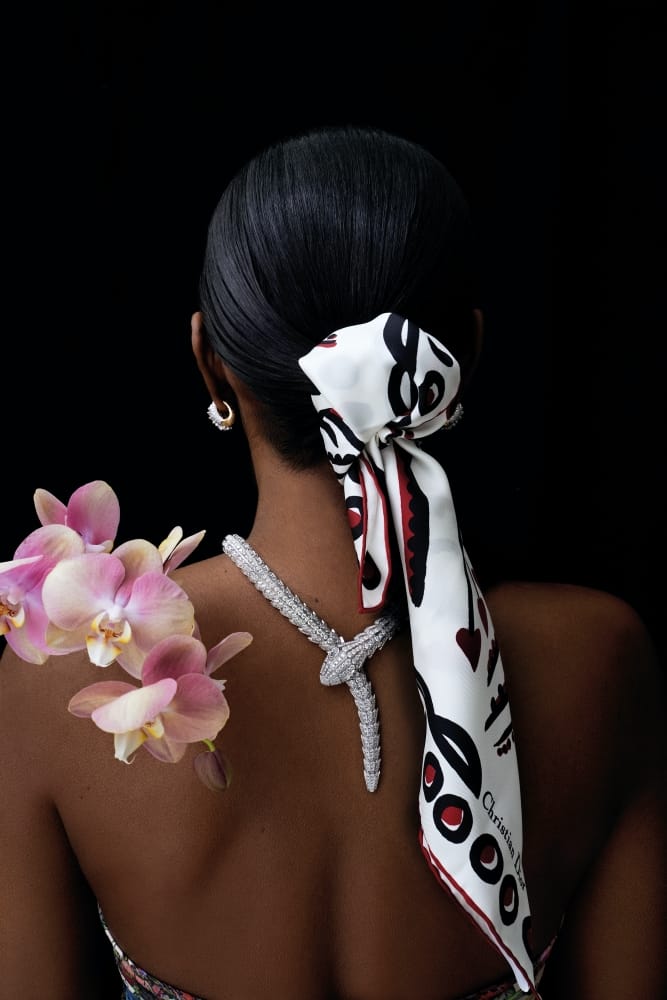Half-Malay, half-Sudanese model Iman Mohamed Osman has a conversation with BAZAAR about the painful trauma of colourism she experienced since childhood and the long journey it took to reach self-acceptance.
PHOTOGRAPHED BY EDMUND LEE STYLING AND CONCEPT BY AI LIM
TEXT BY ABDUL AZIZ DRAIM
As traumatic as her experiences have been being on the receiving end of colourism as well as racism for being African, Iman Mohamed Osman is choosing not to be a victim anymore. “I am very proud of my race and colour. Despite all the negativity, I have achieved so many things in my life, big or small. So my advice to the girls out there, as well as those of my generation who are going to grow up and have children of their own: never allow anyone to set you back or even comment on the colour of your skin. Always stand up for what you believe in. And to families, all of this start from young. The prejudice might not come from your immediate family, but maybe your aunties, your cousins, the grandparents…”
“I believe from the time when children reach the age of four or five, it’s very important for parents to sit down and talk to them. Not just about skin colour, but about being kind and compassionate to everyone they meet. It’s about how you raise your children. I believe every family has their degree of dysfunction, but when it comes to beauty and skin colour, that shouldn’t even be the problem. It’s about the kind of person you are, the talent that you have, the personality that you carry. And that’s what my mum kept reminding me. That you have to embrace your roots, that this is what God has given you, and you should change nothing about that.”

Scarf, DIOR. Earrings; and necklace, both from BULGARI High Jewellery Serpenti Collection.
Speaking of her roots, four years ago, Iman had the chance to return to Sudan to attend her grandmother’s funeral. Initial plans were to stay there for ten days, but Iman ended up being in Khartoum, her kampung, for three whole months. “My uncles and aunties would always invite us to join in some community work, helping out the less unfortunate around us. One day it could be helping to pack food to feed 300 people. I truly enjoyed the experience. It made me think of maybe starting something similar once I get back to Malaysia, but that never really came to fruition. Until the flood disaster of last December.”
Along with a group of her friends, Iman had helped to collect and distribute food and supplies to those affected by Malaysia’s worst flood in 50 years. The tragedy has reportedly displaced more than 71,000 residents, and affected more than 125,000 people. “There was a group of people in Ampang, coming together for the flood victims so I decided to jump in. My heart just sank when I saw the devastation from the floods. Here I was complaining about life in lockdown yet these people had their lives turned upside down in just one night. From homes to small businesses, they lost everything. It made me realise how fortunate I was.”
Much like her experience in Sudan, Iman realised how much she loved being able to give back to her community. What was thought to be a brief stint eventually stretched to 30 days as the group received even more contributions from various NGOs and good samaritans, with access to even more affected areas throughout Selangor. Powered by their strong network, volunteerism and community spirit, Iman and the group was then inspired to form their own NGO, Pertubuhan Kebajikan Cahaya Ampang. “We have our logo now and are going through the registration process. Pertubuhan Kebajikan Cahaya Ampang will focus on community, offering humanitarian aid, helping the underprivileged and vulnerable communities, such as old folks’ homes and residents who have lost their jobs because of the flood or COVID. We are even planning to organise events. For instance, there’s this group of young girls who aspire to become make-up artists, so we’re thinking about having a community event, a barbecue maybe, and we can then talk to them, teach them about make-up, how to communicate with people and to give them the confidence to pursue their dreams. It’s not just about donations, but also to think of how we can help the community to get back on their feet again.”
MAKE-UP Khir Khalid HAIR Juno Ko & Ckay Liow
FLORAL DESIGNER Dianthus Goh
FLORAL DESIGNER ASSISTANTS Adam Kiss & Jean Galvadores
STYLIST’S ASSISTANT Zhi Ying & Alisha Azuddin
PHOTOGRAPHER’S ASSISTANT Christine Chang
ASSOCIATE ART DIRECTOR Khairani Ramli PRODUCTION Edmund Lee
abd. aziz draim
Currently the creative director of BAZAAR, Aziz has been helming architecture, fashion, and design magazines for two decades now, and he’s been doing it in two languages to boot. Citing Rei Kawakubo, Vivienne Westwood and Jean Paul Gaultier as his earliest fashion gurus, this amateur poet believes that nobody deserves an ugly pair of shoes.



